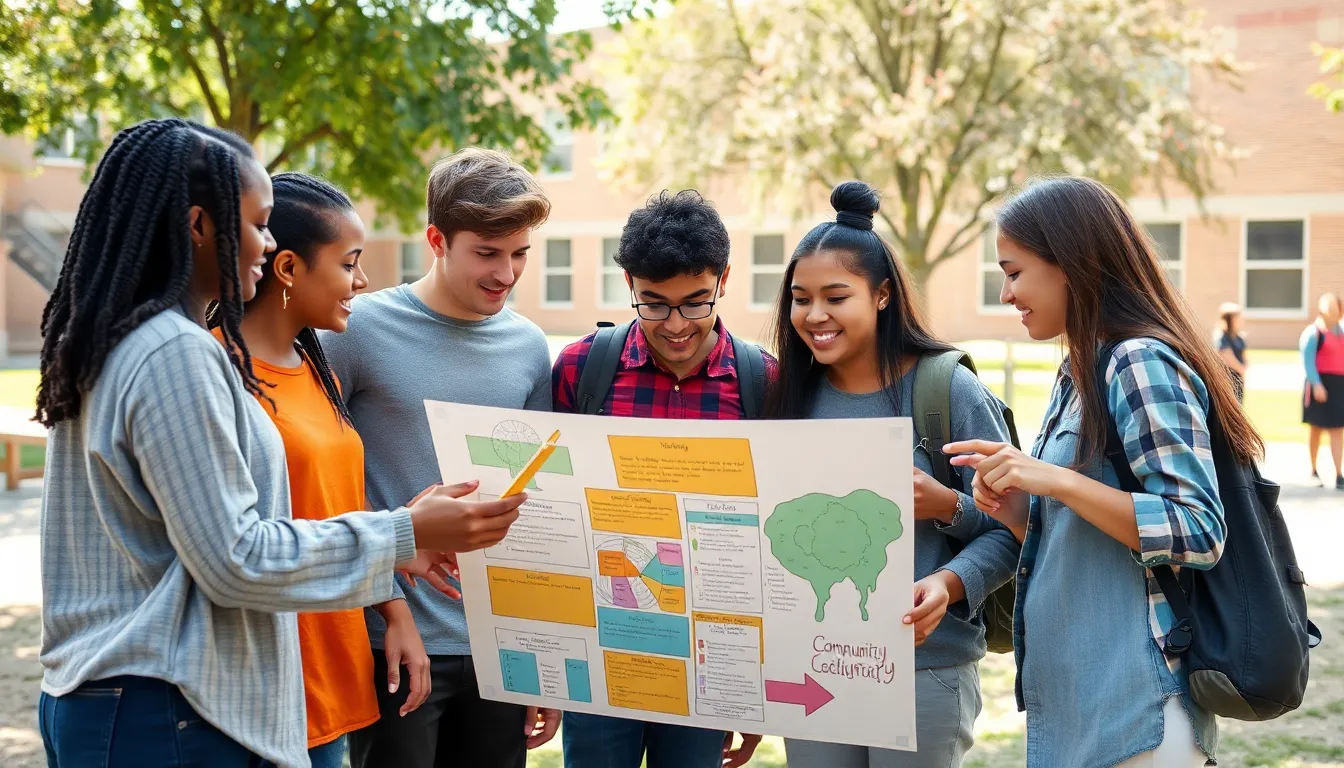In today’s fast-paced educational landscape, student leadership programs are the secret sauce for cultivating tomorrow’s leaders. These programs don’t just teach students how to lead; they transform them into confident decision-makers, skilled communicators, and masters of teamwork. Think of it as a superhero training camp—minus the capes and spandex.
But why should students care? Because leadership skills aren’t just for the boardroom; they’re essential for life. Whether it’s organizing a school event or rallying friends for a cause, these programs empower students to take charge and make an impact. So, if they’re ready to swap their textbooks for some real-world experience, student leadership programs might just be the adventure they didn’t know they needed.
Table of Contents
ToggleOverview of Student Leadership Programs
Student leadership programs offer opportunities for young individuals to cultivate key competencies that benefit their futures. Through structured activities, participants enhance their decision-making abilities, honing skills essential for effective leadership. These programs often emphasize communication techniques, encouraging students to articulate ideas clearly and persuasively.
Collaboration represents another crucial element of these initiatives. Participants learn to work cohesively in teams, understanding group dynamics and the importance of diverse perspectives. They engage in projects that require cooperative problem-solving, often leading to meaningful community contributions.
Real-world experiences dominate the curriculum of student leadership programs. Students frequently take part in initiatives that address relevant social issues, enabling them to apply their skills to practical situations. This hands-on approach reinforces learned concepts while empowering students to effect change within their communities.
Mentorship plays a significant role in these programs. Experienced leaders guide students, providing valuable insights and fostering personal growth. Such interactions often inspire participants to pursue leadership roles beyond the classroom, reinforcing the idea that leadership capabilities can flourish in various environments.
Overall, student leadership programs represent essential training grounds for future leaders, equipping them with varied skills and experiences that translate well into everyday challenges. Engaging in these initiatives not only prepares students for academic responsibilities but also builds a foundation for successful careers and impactful civic participation.
Benefits of Student Leadership Programs

Student leadership programs offer numerous advantages that extend beyond the classroom. Participants gain vital skills and experiences, which significantly influence their overall development.
Personal Development Skills
Students enhance their self-confidence by stepping into leadership roles. Effective communication skills grow as they articulate thoughts and ideas clearly. Decision-making abilities improve through real-world problem-solving scenarios, encouraging critical thinking. Teamwork fosters collaboration as they learn to work effectively with peers. Emotional intelligence also develops, allowing them to navigate diverse social situations. Through these programs, individuals cultivate resilience, preparing them to face future challenges.
Academic Enhancement
Academic performance often benefits from participation in leadership programs. Improved organizational skills lead to better time management and study habits. Enhanced public speaking abilities create opportunities for participation in class and presentations. Engagement in community projects provides practical applications of school subjects, deepening understanding. Networking opportunities with experienced professionals expose students to various career paths. Motivation to excel academically increases as they observe the real-world impact of their efforts.
Types of Student Leadership Programs
Student leadership programs encompass various initiatives that empower youth. These initiatives can be broadly categorized into school-based initiatives and community engagement programs.
School-Based Initiatives
School-based initiatives focus on developing leadership skills within the educational setting. Programs such as student councils facilitate governance among peers, encouraging representatives to address issues affecting their classmates. Leadership training workshops providing interactive skill-building experiences enhance confidence and collaboration. Additionally, mentoring programs connect younger students with seniors, fostering guidance and support. These initiatives also include clubs that emphasize teamwork and project management, providing real-world applications that prepare students for future challenges. Participation in these activities cultivates essential competencies and strengthens school spirit.
Community Engagement Programs
Community engagement programs enable students to connect with their local areas. Initiatives such as service-learning projects immerse students in real societal challenges, allowing them to contribute actively while honing leadership skills. Collaborative efforts with local organizations promote teamwork through community service activities. Environmental stewardship programs develop awareness of ecological issues, inviting students to lead projects like recycling drives. Furthermore, internships with nonprofits provide hands-on experience, exposing participants to diverse roles within the community. Engaging with local leaders enhances networking opportunities and showcases the importance of civic responsibility in shaping future leaders.
Key Components of Successful Programs
Successful student leadership programs incorporate several key components that enhance the development of young leaders. Two of the most critical elements are mentorship and teamwork.
Mentorship and Guidance
Mentorship is vital in student leadership programs. Experienced mentors provide invaluable advice and support to participants. Through regular interactions, students gain insights into leadership styles and decision-making processes. Often, these mentors help students set goals, navigate challenges, and build confidence. One-on-one guidance fosters personal growth and encourages students to take initiative. Programs that integrate mentorship enhance the overall experience, creating a supportive environment for emerging leaders. The connection formed often inspires students to pursue further leadership roles in their academic and professional lives.
Teamwork and Collaboration
Teamwork and collaboration play a crucial role in leadership development. Working together on projects allows students to develop interpersonal skills and learn the importance of diverse perspectives. Students engage in cooperative problem-solving, fostering a sense of community among peers. Programs that emphasize teamwork encourage effective communication and conflict resolution skills. Participants often learn to appreciate the strengths of their teammates, which enhances collective performance. Opportunities for collaboration can lead to impactful community projects, demonstrating the real-world application of their skills. Cultivating a collaborative spirit prepares students for future workplace environments where teamwork is essential.
Student leadership programs play a vital role in shaping the leaders of tomorrow. By fostering essential skills and providing real-world experiences, these programs prepare students for academic and professional success. The emphasis on mentorship and teamwork not only enhances personal growth but also cultivates a sense of civic responsibility.
Engaging in these initiatives opens doors to networking opportunities and enriches students’ understanding of their communities. As participants develop confidence and effective communication skills, they become well-equipped to tackle future challenges. Investing time in student leadership programs is a significant step toward creating impactful leaders who can make a difference in their schools and beyond.



